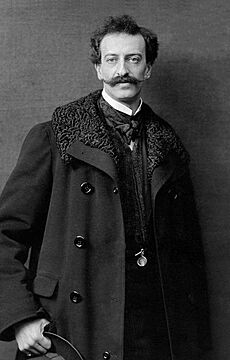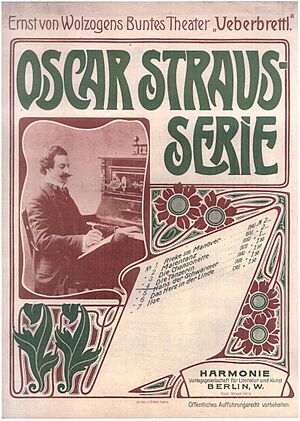Oscar Straus (composer) facts for kids
Oscar Nathan Straus (born March 6, 1870 – died January 11, 1954) was a famous composer from Vienna, Austria. He wrote many different types of music. He was especially known for his operettas, which are like light operas with singing and speaking. He also created music for movies and wrote many songs.
Oscar Straus wrote about 500 songs for cabaret shows. He also composed chamber music and pieces for orchestras and choirs. His real last name was actually Strauss, but he dropped the last 's'. He did this so people wouldn't confuse him with the famous Strauss family of musicians in Vienna. In 1898, another famous composer, Johann Strauss II, advised him to focus on theater music. This turned out to be a very good idea for his career.
Oscar Straus came from a Jewish family. He studied music in Berlin with a teacher named Max Bruch. After his studies, he became a conductor for orchestras. He worked at a cabaret called Überbrettl. Later, he moved back to Vienna. There, he started writing operettas and became a big competitor to another popular composer, Franz Lehár. When Lehár's famous operetta The Merry Widow came out in 1905, Straus supposedly said, "I can do that too!"
In 1939, when the Anschluss happened (when Nazi Germany took over Austria), Oscar Straus had to leave his home. He fled to Paris, France. There, he was given a special award called the Chevalier of the Légion d'honneur. In 1940, he had to flee again, this time to the United States, going through Portugal. He settled in Hollywood, California, where he continued his work. After World War II ended, he returned to Europe. He settled in a town called Bad Ischl, where he later passed away. His grave is in the Bad Ischl Friedhof cemetery.
Straus is most famous for his operettas Ein Walzertraum (which means A Waltz Dream) and The Chocolate Soldier (also known as Der tapfere Soldat). The waltz music from A Waltz Dream is one of his most popular orchestral pieces. He also wrote the well-known theme music for the 1950 film La Ronde.
Contents
Works
Operettas
- Die lustigen Nibelungen (The Merry Nibelungs) – 1904
- Ein Walzertraum (A Waltz Dream) – 1907
- Der tapfere Soldat (The Gallant Soldier, The Chocolate Soldier) – 1908
- Mein junger Herr (My Son John) – 1910
- Der tapfere Cassian (The Brave Cassian) – 1912
- Der letzte Walzer (The Last Waltz) – 1920
- Die Perlen der Cleopatra – 1923
- Drei Walzer (Three Waltzes) – 1935
- Bozena – 1952
Ballets
- Colombine – 1904
- Die Prinzessin von Tragant – 1912
Orchestral Music
- Piano Concerto in B Minor – 1893
- Serenade for String Orchestra in G Minor, Op. 35 – 1905
Film Scores
- A Lady's Morals – 1930
- The Smiling Lieutenant – 1931
- One Hour with You – 1932
- Land Without Music – 1935
- La Ronde – 1950
See also
 In Spanish: Oscar Straus para niños
In Spanish: Oscar Straus para niños
 | Valerie Thomas |
 | Frederick McKinley Jones |
 | George Edward Alcorn Jr. |
 | Thomas Mensah |



